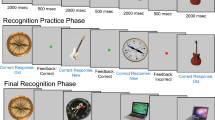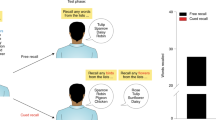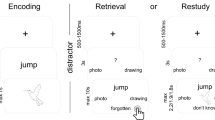Abstract
The observation that retrieval returns a stable memory into a labile state cannot be readily explained by any simple version of consolidation theory. This finding has been interpreted as evidence for the need to reconsolidate a memory after reactivating it. However, as we discuss in this commentary, other behavioural observations indicate that even this modification to consolidation theory may be insufficient to describe the dynamic properties of memory.
This is a preview of subscription content, access via your institution
Access options
Subscribe to this journal
Receive 12 print issues and online access
$189.00 per year
only $15.75 per issue
Buy this article
- Purchase on Springer Link
- Instant access to full article PDF
Prices may be subject to local taxes which are calculated during checkout
Similar content being viewed by others
References
Müller, G. E. & Pilzecker, A. Experimentelle beitrage zur lehre vom gedachtnis. Z. Psychol.. S1, 1–288 (1900).
Hebb, D. O. The organization of behavior (Wiley, New York, 1949 ).
McGaugh, J. L. Time-dependent processes in memory storage. Science 153, 1351–1358 (1966).
Bliss, T. V. & Collingridge, G. L. A synaptic model of memory: Long–term potentiation in the hippocampus. Nature 361, 310–319 (1993).
McGaugh, J. L. Memory — a century of consolidation. Science 287, 248–251 (2000).
Sara, S. J. Retrieval and reconsolidation: Toward a neurobiology of remembering. Learn. Mem. 7, 73–84 ( 2000).
Misanin, J. R., Miller, R. R. & Lewis, D. J. Retrograde amnesia produced by electroconvulsive shock after reactivation of a consolidation memory trace. Science 160, 554–555 ( 1968).
Mactutus, C. F., Riccio, D. C. & Ferek, J. M. Retrograde amnesia for old (reactivated) memory: Some anomalous characteristics. Science 204, 1319–1320 (1979).
Robbins, M. J. & Meyer, D. R. Motivational control of retrograde amnesia. J. Comp. Physiol. Psychol. 84, 220–225 (1970).
Howard, R. L., Glendenning, R. L. & Meyer, D. R. Motivational control of retrograde amnesia: Further explorations and effects. J. Comp. Physiol. Psychol. 86, 187–192 (1974).
Nader, K., Schafe, G. E. & LeDoux, J. E. Fear memories require protein synthesis in the amygdala for reconsolidation after retrieval. Nature 406 722–726 (2000).
Judge, M. E. & Quartermain, D. Characteristics of retrograde amnesia following reactivation of memory in mice. Physiol. Behav. 28, 585–590 ( 1982).
Land, C., Bunsey, M. & Riccio, D. C. Anomalous properties of hippocampal lesion–induced retrograde amnesia. Psychobiology (in the press).
Miller, R. R. & Springer, A. D. Temporal course of amnesia in rats after electroconvulsive shock. Physiol. Behav. 6, 229–233 (1971).
Geller, A. & Jarvik, M. E. The time relations of ECS-induced amnesia. Psychon. Sci. 12, 169– 170 (1968).
Lewis, D. J., Miller, R. R. & Misanin, J. R. Selective amnesia produced by ECS. J. Comp. Physiol. Psychol. 69, 136–140 (1969).
Miller, R. R. Effects of environmental complexity on amnesia induced by electroconvulsive shock in the rat. J. Comp. Physiol. Psychol. 71, 267–275 (1970).
Lewis, D. J., Misanin, J. R. & Miller, R. R. The recovery of memory following amnestic treatment . Nature 220, 704–705 (1968).
Miller, R. R., Ott, C. A., Berk, A. M. & Springer, A. D. Appetitive memory restoration after electroconvulsive shock in the rat. J. Comp. Physiol. Psychol. 87, 717–723 (1974).
Gordon, W. C. & Mowrer, R. R. The use of an extinction trial as a reminder treatment following ECS. Anim. Learn. Behav. 8, 363–367 (1980).
Gold, P. E. & King, R. A. Retrograde amnesia: Storage failure vs. retrieval failure. Psychol. Rev. 81, 465–469 (1974).
Bartlett, F. C. Remembering: A Study in Experimental and Social Psychology (Cambridge Univ. Press, Cambridge, UK, 1932).
Roediger, H. L. in The Psychology of Learning and Motivation. Advances in Research and Theory Vol. 30, (ed. Medin, D. L.) 97– 134 (Academic, San Diego, 1993).
Nadel, L. & Land, C. Memory traces revisited. Nature Rev. Neurosci. 1, 209–212 (2000).
Miller, R. R. & Springer, A. D. Amnesia, consolidation, and retrieval. Psychol. Rev. 80, 69– 79 (1973).
Riccio, D. C. & Richardson, R. The status of memory following experimentally induced amnesias: gone, but not forgotten. Physiol. Psychol. 12, 59–72 ( 1984).
Acknowledgements
Support for the preparation of this manuscript was provided by the National Institute of Mental Health. Thanks are due to Cantey Land and Steven Stout for their comments on an earlier version of the manuscript.
Author information
Authors and Affiliations
Corresponding author
Rights and permissions
About this article
Cite this article
Miller, R., Matzel, L. Memory involves far more than 'consolidation'. Nat Rev Neurosci 1, 214–216 (2000). https://doi.org/10.1038/35044578
Issue Date:
DOI: https://doi.org/10.1038/35044578
This article is cited by
-
Glucocorticoid Homeostasis in the Dentate Gyrus Is Essential for Opiate Withdrawal-Associated Memories
Molecular Neurobiology (2017)
-
Memory of Conditioned Taste Aversion Is Erased by Inhibition of PI3K in the Insular Cortex
Neuropsychopharmacology (2013)
-
Mind-Dependence. The Past in the Grip of the Present
Journal of Bioeconomics (2007)
-
Interpretations of retrograde amnesia: old problems redux
Nature Reviews Neuroscience (2001)
-
Strengthening the shaky trace through retrieval
Nature Reviews Neuroscience (2000)



